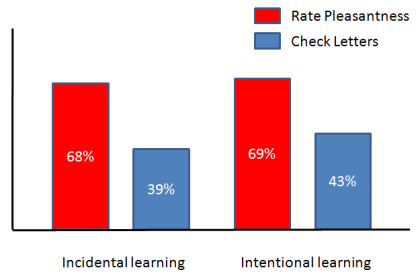Make exams easier to make them harder
This gallery contains 1 photo.
By Sam Graham You’re sitting in a bar. (No, this isn’t a joke.) Your friend tells you his great aunt just died. You offer sympathy, and say that dying must be a frightening experience. Your friend says that it’s not if you think about it. You go home. You tell your husband or wife about […]
The LSU Top 5 #41
This is the 41st of our weekly links to the top 5 bits and pieces we’ve found from around the internet. (Linking doesn’t mean we necessarily agree with these articles!) College student loses lawsuit over lusty writings – AP Not many would defend a teacher professing their attraction to a student, but what about when […]
Rote Learning: the best of a bad lot?
By Sam Graham and Truong Thuy Van, LSU Rote learning has a bad name in the West. Sure, we need to memorise things. An immediate grasp of times tables, for example, is useful. We also need a foundation of knowledge before we can do any serious thinking. However, encouraging rote learning or memorisation for it’s […]
The LSU Top 5 #32
This is the 32nd of our weekly links to the top 5 bits and pieces we’ve found from around the internet.
(Linking doesn’t mean we necessarily agree with these articles!)
My worst student – Times Higher Education
This article tackles a topic that’s taboo to talk about publically: your worst student.
I know. You think that there’s no such thing as a worst student – only more or less challenging ones…. You’d be wrong, but the mistake is an honest one. In truth, academics who don’t care about their students or about teaching are generally the ones that never encounter a “worst” student. To their way of thinking, every student is a bothersome distraction and the best that one can do is ignore these distractions and stay on task.
This led to some Twitter contributions…
…which in turn led to the National Union of Students starting #mybestlecturer. (The power of turning the other cheek!)
‘Revision techniques – The good, the ok and the useless’ – BBC
Do you use a highlighter when you prepare for an exam? Do you know someone who tries to remember blocks of text when revising? This article explains how these two tactics may be useless or even harmful when it comes to effective revision of information. According to the article, only 2 out of the 10 methods they reviewed actually help people revise effectively!
When “big bosses” want to obtain master degrees – VietnamNet Bridge
Degrees provide a signal that the holder has demonstrated knowledge and ability in their field, and that they are capable of working hard and persevering. They also confer status on the degree holder. So what happens when you can get the status and signal without actually doing any work or learning anything?
Going to class for others has become a very popular service. A lecturer who asked to be anonymous, said that 1/3 of the learners at her class are not the real learners.
And why? Well, why not?
There are many reasons that make the real learners hesitate to go to class. The boss of the student, for example, does not want to go to class not because he is too busy with his works, but simply because he’d rather spend time on relax than on learning.
What Professors Can Learn From ‘Hard Core’ MOOC Students – The Chronicle
Six of the most prolific MOOCs students were asked to give their observations on how much they felt they were learning from their courses and compare the MOOCs learning experience with traditional courses. The article extracts four tips from the interviews that the MOOCs providers could learn from their hard-core students.
Commencement 2013 profile: Michael Forzano – Inside Binghamton University
With the LSU starting to provide a disability support service, we thought we’d link to this story of a recently graduate from Binghamton University in the US who is blind and largely deaf. Now, he’s off to a programming job at Amazon.
We love hearing your thoughts on these articles, so feel free to comment below!
Want to remember? Don’t skim 100 times
The LSU blog turns 1 year old this month. So far we’ve posted over 90 articles, reached over 18,000 viewers and have built our followers to over 300 in 93 countries. Thanks for reading! In honor of this, we are going back to one of our first articles published on this blog – one from […]
The LSU Top 5 #31
This is the 31st of our weekly links to the top 5 bits and pieces we’ve found from around the internet. (Linking doesn’t mean we necessarily agree with these articles!) Policies, not funds, stymie development of universities – Thanh Nien While other countries in the region have top-ranked universities, Vietnam has none. The country is […]
Improve your questioning skills – Part 1
This gallery contains 1 photo.
In order to keep our posts a little easier to read and more digestible, we’re splitting up our longer form posts into two parts. This week, Van focuses on how students can improve their ability to question, and therefore, to learn. By Truong Thuy Van, LSU I imagined that if I raised my hand and […]
The LSU Top 5 #8
This is the eighth of our weekly links to the top 5 interesting bits and pieces we’ve found from around the internet. (Linking doesn’t mean we necessarily agree with these articles!) A Point of View: When students answer back – BBC Mary Beard laments the importance placed on customer satisfaction within universities, wondering if it inhibits hard, ‘destabilising’ study. She says: …the […]
Want to remember? Don’t skim 100 times
By Sam Graham
I recently came across this nice blog post on how trying to memorize something really doesn’t improve your ability to actually remember it.
The key factor is thinking about it deeply.
A 1973 study (referenced on the blog) looked at two factors: shallow and deep processing, and intention and no intention to remember.
Half of the study’s participants were asked to simply check which words and an ‘e’ or ‘g’ in them (shallow processing), and the other half were told to rate how pleasant the word was to them (deep processing). Half of each group were told that they would be quizzed later on what the words were, the other half weren’t.
Those who rated how pleasant the words were remembered far more than those who identified the ‘e’s or ‘g’s. Those who knew there was a test coming remembered on a few more than those who didn’t.
The key implication for us in the LSU and RMIT is this:
If you are a student the implication of this study and those like it is clear : don’t stress yourself with revision where you read and re-read textbooks and course notes. You’ll remember better (and understand much better) if you try and re-organise the material you’ve been given in your own way.
The blog also touches on implications for how information is presented to students (not too organised or they won’t thinking deeply!) and whether it’s reasonable for students to remember information from lectures.



